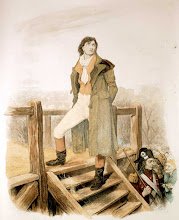
A sovereign nation of aboriginals were given checks for lands stolen that have never been cashed. In their pride they refused, a deep understanding that by cashing those checks they would have accepted to become a part of this government. They hadn't. They were independent. They were free. And they knew it.
Eighty years later this same nation has a new generation, so dislocated from its heritage, from its culture, that it sells their way of life that is the very truest definition of who they are as a people, for a government hand out. Hunters and gatherers at your heart, core and soul - whose charge is stewardship of the resources of this very land - what does the present stewardship of the land have that safeguards it? Where are the salamanders? The tree frogs? The bees and butterflies? Where are the fish? By what right do you forfeit it? On whose behalf do you surrender?
Yet, these Indians, the first stewards, the natural stewards, the only stewards, are given fish sticks for ceremonies and told that they will be allowed "government" recognition, if they eat the handouts and keep their mouths shut. They can have their bingo parlors and their casinos, painted fish on their chips, a made up language with made up stories.
And the white men praise the little Indian boys who sign, and clap one another on the back. Good boys, they say, good boys! Let’s smoke the pipe of peace, and pass the bottle of lightening. The occupiers smile and the paternals smile back. No one notices the tears shed by the maternals. Who notices the woman’s tears? The woman’s memories of where the fish runs are, where the best wapato roots lay, where the bones of ancestors rest?
The impostors come with their braided hair. They wa-wa and wear leather. They play politics and follow “government criteria.” And fat white men in newspaper offices praise them and life is good. For them. For awhile. Until they die. And there is no tomorrow, for those who don’t. But it doesn’t matter. The Chinooks have a bingo parlor and maybe a casino. They have forgotten how to fish and white men always like to gamble. There is a government payroll for a few at the top, and maybe a reservation to drink on for those at the bottom. The average lifespan for an Indian woman on a res is 54. This is good. She doesn’t have too long of a life to remember what was, or suffer what is, or watch what her children become.
Eighty years later this same nation has a new generation, so dislocated from its heritage, from its culture, that it sells their way of life that is the very truest definition of who they are as a people, for a government hand out. Hunters and gatherers at your heart, core and soul - whose charge is stewardship of the resources of this very land - what does the present stewardship of the land have that safeguards it? Where are the salamanders? The tree frogs? The bees and butterflies? Where are the fish? By what right do you forfeit it? On whose behalf do you surrender?
Yet, these Indians, the first stewards, the natural stewards, the only stewards, are given fish sticks for ceremonies and told that they will be allowed "government" recognition, if they eat the handouts and keep their mouths shut. They can have their bingo parlors and their casinos, painted fish on their chips, a made up language with made up stories.
And the white men praise the little Indian boys who sign, and clap one another on the back. Good boys, they say, good boys! Let’s smoke the pipe of peace, and pass the bottle of lightening. The occupiers smile and the paternals smile back. No one notices the tears shed by the maternals. Who notices the woman’s tears? The woman’s memories of where the fish runs are, where the best wapato roots lay, where the bones of ancestors rest?
The impostors come with their braided hair. They wa-wa and wear leather. They play politics and follow “government criteria.” And fat white men in newspaper offices praise them and life is good. For them. For awhile. Until they die. And there is no tomorrow, for those who don’t. But it doesn’t matter. The Chinooks have a bingo parlor and maybe a casino. They have forgotten how to fish and white men always like to gamble. There is a government payroll for a few at the top, and maybe a reservation to drink on for those at the bottom. The average lifespan for an Indian woman on a res is 54. This is good. She doesn’t have too long of a life to remember what was, or suffer what is, or watch what her children become.


